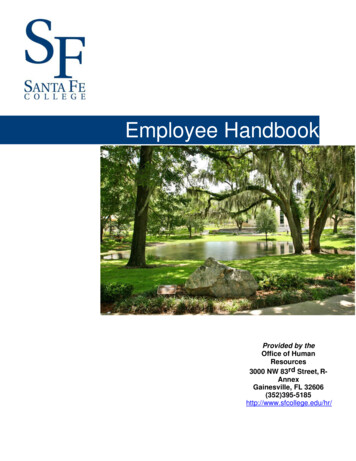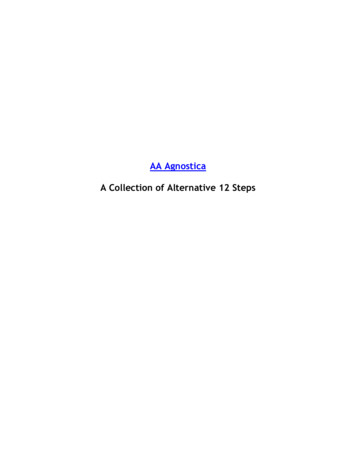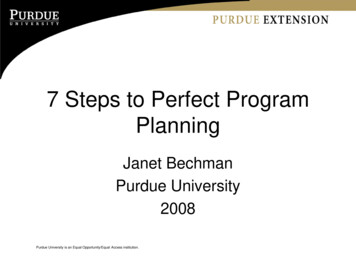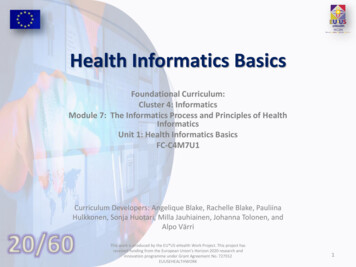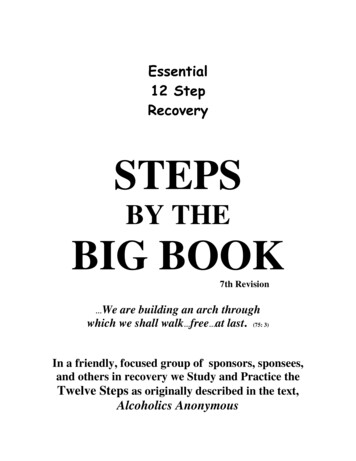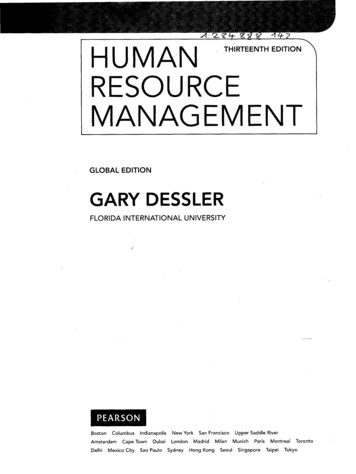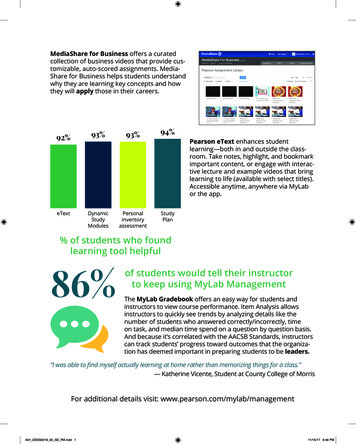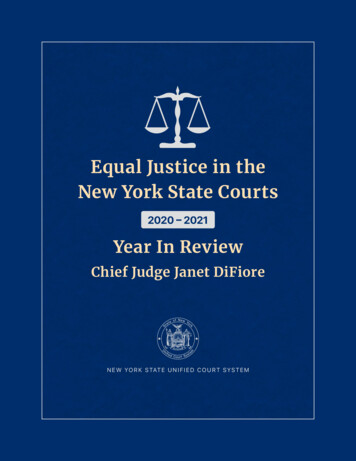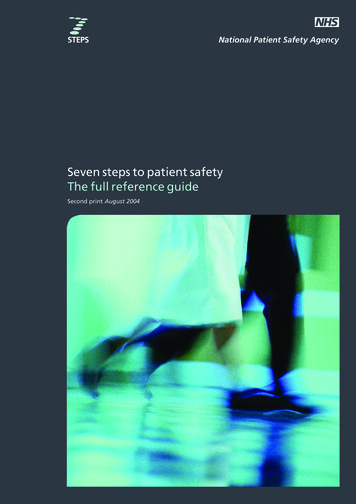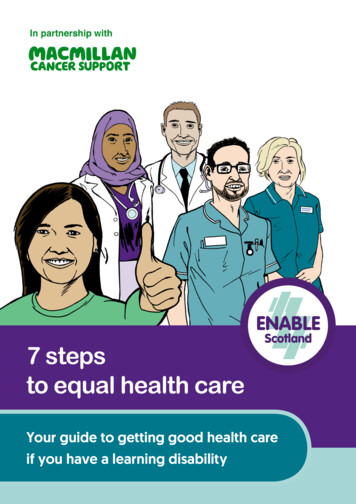
Transcription
7 stepsto equal health careYour guide to getting good health careif you have a learning disability
This booklet is aboutgetting good health careif you have cancer anda learning disability.It uses easywords andpictures to helpyou understandthe information.You might wantsomeone to helpyou look at thisbooklet so you cantalk about it if youneed to.2
There is a word bankat the back of thisbooklet to help youwith hard words.Words in bold andpurple will be in theword bank.If you think you have notbeen given good healthcare, talk to someoneyou trust.Tell them what you areworried about.3
What are the 7 stepsto equal healthcare?The Equality Act 2010 says thatdoctors’ surgeries and hospitalsshould make reasonableadjustments for people whohave a disability.This includes people with alearning disability.Reasonable adjustments arechanges that can be made tomake sure you get the same careas everybody else.They could change things likehow they make appointmentsand how they plan your care.4
The 7 steps to equal healthcareare a set of guidelines.We think staff should follow themwhen they care for a person whohas a learning disability.Going to the doctors or thehospital can be scary for anyone.Sometimes it can be even morescary if you have a learningdisability.It can be less scary if you knowwhat staff can do to help you.In this booklet we are going toshow you 7 things that staff cando to make things easier.5
You can take this booklet with youto show your doctor or nurse.1. Imagine being meStep 1 asks doctors and nurses tothink about how they may feelwhen they go to the doctoror the hospital.This can help them to think abouthow you may be feeling.6
You may be feeling: in pain unwell scared worried7
alone confused uoverwhelmed – likeeverything that is happening istoo much.If the staff know how you feel,they will be able to do thingsbetter so you don’t feel as bad.8
2. Find out who and whatmatters to meStep 2 is about finding out whatmakes you happy and sad.It helps staff think about how tomake things easier for you at thehospital or doctors.The more staff know about you,the easier it will be for them tocare for you.There are some main points thatwill be helpful: what helps you stay relaxed9
what makes you feel stressed who are the people you aremost comfortable with.You can use our booklet ‘Thingsthat are important to me’ to tellstaff what matters to you.You can find this on MacmillanCancer Support’s website (seepage 23).10
3. Listen to mePeople communicate in differentways. Some people use wordsand some people do not.Doctors and nurses know thateven if someone does not usewords, they can still communicate.If a person does not use words,they may tell the doctor or nursehow they are feeling using theirface or body.11
Even if a person does use words,they might not always be able tothink of the right words.When people find it hardto communicate they canget frustrated.They might act in a way thathurts themselves or peoplearound them. For example,they might swear or getangry with someone.Step 3 asks doctors andnurses to find the best way tocommunicate with you. This willmake it easier for both of you.12
If you find it hard tocommunicate, staff should askyou if you have acommunication passport.They should also ask the peoplewho know you what is the bestway to communicate with you.4. Give me the information I need,in the way that I need itIf you are going to the hospitalor to the doctor, they will giveyou information about whatis happening.13
Step 4 says that staff should try totell you what you need to knowin a way that you can understand. If you do not understand whatthey are saying, ask them to tellyou again in a way that may beeasier for you.You can also ask a family memberor friend to help the staffexplain it to you.You may be able to get someinformation in easy read or otherformats which are easier for youto understand.14
5. Think about where we areWhat a place is like can affecthow you feel. For example, if it istoo hot, too cold, loud or busy,then you might find it hard tostay calm.Step 5 asks doctors and nurses tothink about this.This could mean that you are tooupset or overwhelmed to getthe treatment or care that you arethere for.If there are things at the hospitalor doctors that make you feelbad, tell someone you trust.15
The staff can sometimes changehow they do things to makethings easier for you. Thesechanges are called reasonableadjustments.6. Work with others who are in my lifeThe people in your life can helpstaff know more about you andthe best way to care for you.You may have lots of differentpeople in your life who couldhelp.16
They could be: people in your family friends support workers social workers17
a learning disability nurse carers someone from a religiousgroup people you work with.18
For you to get the best care, step6 asks staff to speak to some ofthe people who help you in yourlife.This should only happen if youwant the staff to talk to thesepeople.7. Giving treatment seems too difficult?Think again.Sometimes doctors find it harderto give treatment to someonewith a learning disability.This can mean that people with alearning disability do not alwaysget the treatment they need.19
If the doctor is worried about youhaving the treatment, they shouldtalk to you and the importantpeople in your life.Step 7 says they should thinkabout ways to make thetreatment easier so youcan have it.Sometimes treatment might notbe possible. But your treatmentshould never be stoppedbecause your learning disabilitymakes it more difficult.If the hospital has a learningdisability liaison nurse they maybe able to help.If not, then staff can contact thecommunity learning disabilityteam.20
Word bankAppointmentThis is a date and time that is set foryou to see a doctor or nurse.CommunicateWhen you share your thoughts,feelings or information with anotherperson.Communication passportThis is a booklet about the best wayto communicate with you. Peoplecan read this and learn the best wayto communicate with you.It might also have pictures in it thatyou can use to tell people what youare thinking.21
Equality Act 2010*This is part of the law and it says thateveryone should be treated thesame in public places and serviceslike hospitals and doctors.It also says you should be treatedfairly at work.*In Northern Ireland, they have adifferent law called the DisabilityDiscrimination Act 1995(equalityni.org)OverwhelmedThis is when something happensand you have very strong feelingsabout it. Sometimes it feels like youhave too many thoughts or feelings.These can be good or bad.Reasonable adjustmentsThese are changes made by publicplaces, services and work places tomake sure people with a disabilityare treated the same as everyoneelse.22
LinksMacmillan Cancer Supporthas lots of booklets aboutcancer in easy read.macmillan.org.uk/easyreadGov.uk has moreinformation on The EqualityAct 2010 in easy quality-act-makingequality-realEnable Scotland hasinformation and supportfor people with a learningdisability.enable.org.uk23
This booklet helps you learn about what good care should look like if youhave a learning disability.It talks about the 7 steps to equal healthcare, which nurses and doctorsshould follow when they treat you.If you have more questions aboutcancer or would like to talkto someone, call the free MacmillanSupport Line on0808 808 00 00Monday to Friday from 9am to 8pm.If you use a textphone, you can callthe Macmillan Support Line using theNext Generation Text (NGT) serviceby dialling18001 0808 808 00 00Or go to the websitemacmillan.org.ukThis easy read booklet has been produced by ENABLE Scotlandand Macmillan Cancer Support working with CHANGE.MAC17196 Produced June 2018.Next planned review 2021. Macmillan Cancer Support. All illustrations CHANGE.Macmillan Cancer Support, registered charity in England andWales (261017), Scotland (SC39907) and the Isle of Man (604).
7 steps to equal health care Your guide to getting good health care if you have a learning disability. This booklet is about getting good health care if you have cancer and a learning disability. You might want someone to help you look at this book
